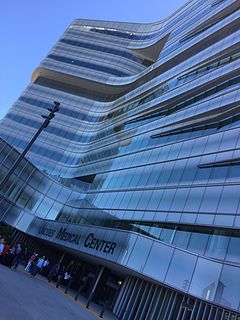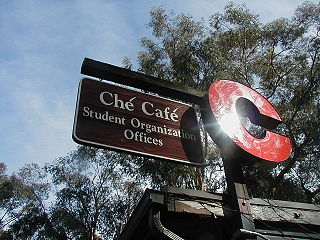
The University of California, San Diego is a public land-grant research university in San Diego, California. Established in 1960 near the pre-existing Scripps Institution of Oceanography, UC San Diego is the southernmost of the ten campuses of the University of California, and offers over 200 undergraduate and graduate degree programs, enrolling 33,343 undergraduate and 9,533 graduate students. The university occupies 2,178 acres (881 ha) near the coast of the Pacific Ocean, with the main campus resting on approximately 1,152 acres (466 ha). UC San Diego is ranked among the best universities in the world by major college and university rankings.
Electronic civil disobedience can refer to any type of civil disobedience in which the participants use information technology to carry out their actions. Electronic civil disobedience often involves computers and the Internet and may also be known as hacktivism. The term "electronic civil disobedience" was coined in the critical writings of Critical Art Ensemble (CAE), a collective of tactical media artists and practitioners, in their seminal 1996 text, Electronic Civil Disobedience: And Other Unpopular Ideas. Electronic civil disobedience seeks to continue the practices of nonviolent-yet-disruptive protest originally pioneered by American poet Henry David Thoreau, who in 1848 published Civil Disobedience.

Black's Beach is a secluded section of beach beneath the bluffs of Torrey Pines on the Pacific Ocean in La Jolla, San Diego, California, United States. It is officially part of Torrey Pines State Beach. The northern portion of Black's Beach is owned and managed by the California Department of Parks and Recreation, while the southern portion of the beach, officially known as Torrey Pines City Beach, is jointly owned by the city of San Diego and the state park, but is managed by the city of San Diego. This distinction is important as Black's Beach is most known as a nude beach, a practice that is now prohibited in the southern portion managed by the city of San Diego.

Revelle College is the oldest residential college at the University of California, San Diego in La Jolla, California. Founded in 1964, it is named after oceanographer and UC San Diego founder Roger Revelle. UC San Diego—along with Revelle College—was founded at the height of the Space Race between the United States and the Soviet Union. As a result, the initial class of 181 undergraduates comprised only 30 non-science majors. Revelle College focuses on developing "a well-rounded student who is intellectually skilled and prepared for competition in a complex world."

UC San Diego Health is the academic health system of the University of California, San Diego in San Diego, California. It is the only academic health system serving San Diego and has one of only two adult Level I trauma centers in the region. In operation since 1966, it comprises UC San Diego Medical Center in Hillcrest as well as Jacobs Medical Center, Moores Cancer Center, Shiley Eye Institute, Sulpizio Cardiovascular Center, and Koman Family Outpatient Pavilion, all located in La Jolla. It also includes several outpatient sites located throughout San Diego County. The health system works closely with the university's School of Medicine and Skaggs School of Pharmacy to provide training to medical and pharmacy students and advanced clinical care to patients.

The Ché Café is a worker co-operative, social center, and live music venue located on the University of California San Diego campus in La Jolla, California, USA. Zack de la Rocha described the Ché Café as "A place that is not only a great venue, but a source of inspiration and community building for any artist, student, or worker that has entered its doors."

Luis Andrew Martinez was an activist who was known at the University of California, Berkeley as the Naked Guy.

The University of California San Diego School of Medicine is the graduate medical school of the University of California, San Diego. It was the third medical school in the University of California system, after those established at UCSF and UCLA, and is the only medical school in the San Diego metropolitan area. It is closely affiliated with the medical centers that are part of UC San Diego Health.

The Koala is a satirical comedy college paper. In its current form, it exists as two unaffiliated publications, with one primarily distributed quarterly on the campus of University of California San Diego, and monthly on the campus of San Diego State University. The publication at UCSD was one of a handful of campus newspapers partly or entirely funded by the Associated Students of UCSD, until a decision by AS UCSD to defund all 13 student media outlets. The paper still exists as a registered student organization. SDSU's branch of The Koala at one point operated within SDSU Associated Students as a Recognized Student Organization (RSO) until that status was revoked in 2007. The original branch of The Koala was founded at UCSD in 1982, but the details of its origins are uncertain. The composition of the paper consists of artwork, articles, personals, and lists similar to David Letterman's Top Ten List. The Koala's standing protocol when giving interviews to commercial media of any sort is that no statement can be given until they are furnished with beer from the interviewing entity. Exceptions are made for student media as a matter of courtesy.Therefore, it does give an insight into the live of a Koala, but does butify the situation as well.
California Cultures in Comparative Perspective is a program at the University of California, San Diego in California dedicated to fostering creative and activist interdisciplinary research, teaching, and collaboration among California's communities, faculty, and students. California – in all its dimensions—is the object of its focus.

Price Center is a student center located in the center of the University of California San Diego campus, just south of Geisel Library. As one of the largest student centers in the country, Price Center serves more than 30,000 visitors a day. Price Center offers a variety of services, places, and spaces geared to the needs of students including fast food restaurants, the campus bookstore, a movie theater, and offices for various student organizations.

The California Institute for Telecommunications and Information Technology (Calit2, previously Cal(IT)2), also referred to as the Qualcomm Institute (QI) at its San Diego branch, is a $400 million academic research institution jointly run by the University of California San Diego (UCSD) and the University of California, Irvine (UCI); in January 2022, plans were announced to add University of California, Riverside to the consortium. Calit2 was established in 2000 as one of the four UC Gray Davis Institutes for Science and Innovation. As a multidisciplinary research institution, it is conducting research discovering new ways in which emerging technologies can improve the state's economy and citizens' quality of life. Keeping in mind its goal of addressing large-scale societal issues, Calit2 extends beyond education and research by also focusing on the development and deployment of prototype infrastructure for testing new solutions in real world environments. Calit2 also provides an academic research environment in which students can work alongside industry professionals to take part in conducting research and prototyping and testing new technologies.
The UC San Diego Tritons are the athletic teams that represent the University of California, San Diego. UC San Diego has 23 varsity sports teams and offers student participation in a wide range of sports. As of July 1, 2020, all UC San Diego teams participate at the NCAA Division I (DI) level in the Big West Conference. During their time in NCAA Division II and the California Collegiate Athletic Association starting in the 2000–01 season, UCSD placed in the top 5 in the Division II NACDA Directors' Cup standings nine times, including three 2nd-place finishes. NCSA Athletic Recruiting ranked the Tritons as the nation's top Division II program for eight consecutive years.
The Irwin and Joan Jacobs School of Engineering is an undergraduate and graduate-level engineering school offering BS, BA, MEng, MS, MAS and PhD degrees at the University of California, San Diego in San Diego, California. The Jacobs School of Engineering is the youngest engineering school of the nation's top ten, the largest by enrollment in the University of California system, as well as the largest engineering school on the West Coast and the ninth-largest in the country. More than thirty faculty have been named members of the National Academies. The current dean of the Jacobs School of Engineering is Albert P. Pisano. The Jacobs School of Engineering sends a monthly news email which anyone can subscribe to.
Micha Cárdenas, stylized as micha cárdenas, is an American visual and performance artist who is an assistant professor of art and design, specializing in game studies and playable media, at the University of California Santa Cruz. Cárdenas is an artist and theorist who works with the algorithms and poetics of trans people of color in digital media.

The Electronic Disturbance Theater (EDT), established in 1997 by performance artist and writer Ricardo Dominguez, is an electronic company of cyber activists, critical theorists, and performance artists who engage in the development of both the theory and practice of non-violent acts of defiance across and between digital and non-digital spaces.

Elle Mehrmand is a new media performance artist and musician. Mehrmand's work combines the body and electronics. Her performance art work has been presented at museums, galleries and art festivals throughout the Americas. She is a member of the band Assembly of Mazes.
Free the Nipple is a topfreedom campaign created in 2012 during pre-production of a 2014 film of the same name. The campaign highlights the general convention of allowing men to appear topless in public while considering it sexual or indecent for women to do the same, and asserts that this difference is an unjust treatment of women. The campaign argues that it should be legally and culturally acceptable for women to bare their nipples in public.

The Recreation, Intramural, and Athletic Complex is a sports complex at the University of California San Diego comprising an arena, a weight room and various other event and athletic facilities. It is one of the largest college athletic facilities in the country. RIMAC Arena is the home arena of the UC San Diego Tritons men's and women's basketball and volleyball teams, and Triton Soccer Stadium on the adjacent RIMAC Field hosts Triton men's and women's soccer matches.

The UC San Diego Medical Center, Hillcrest is one of two medical centers of UC San Diego Health and is a teaching hospital for the University of California San Diego School of Medicine.













